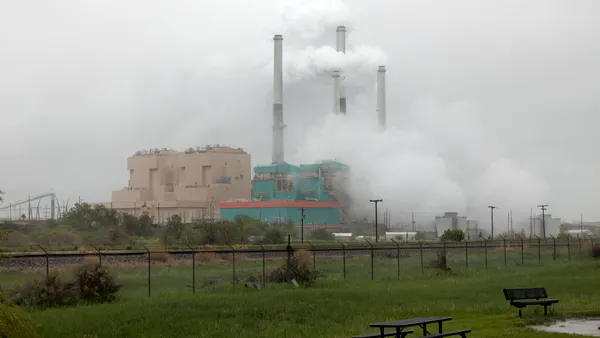Dive Brief:
- The Department of Energy pushed the Federal Energy Regulatory Commission on Friday to boost compensation for generators providing baseload power supplies, proposing the most significant overhaul in the nation's competitive power markets in over a decade.
- DOE filed a Notice of Proposed Rulemaking (NOPR) under the Federal Power Act to enhance grid resilience, directing FERC to "accurately price generation resources necessary to maintain reliability and resiliency." The rule would provide for "recovery of costs of fuel-secure generation units frequently relied upon to make our grid reliable and resilient."
- The filing comes after the completion of a grid reliability study from DOE that urged federal regulators to explore boosting compensation for baseload generators. The NOPR directs FERC to act within 60 days.
Dive Insight:
Released at the end of August, the Department of Energy's grid study concluded that the reliability of the bulk power system is strong today, but changes in the resource mix could present challenges in the future. The report urged federal regulators to begin examining how to better compensate generators for the services they provide for reliability and resilience if it finds reliability is threatened.
The North American Electric Reliability Corporation (NERC) stresses that the grid is not at risk today, with its CEO telling Congress this month that reliability measures are strong and improving.
Even so, Secretary of Energy Rick Perry has been beating the reliability drum in recent days, describing resilience from outages as a national security issue, saying his agency could act to preserve the diversity of the fuel mix and ensure that baseload generation stays online. Coal and nuclear plants across the country are under threat of retirement in the face of competition from cheaper natural gas and renewables.
On Friday, the DOE took a significant step toward those goals, outlining what would be the biggest overhaul in competitive energy markets since their establishment in the late 1990s.
Under the NOPR, generating units in wholesale power markets that have a 90-day fuel supply onsite would be eligible for "full recovery of costs." The plants must be able to provide ancillary and reliability services, be compliant with environmental regulations, and not be subject to cost-of-service recovery by a state.
The rule requires power market operators to "establish just and reasonable rate tariffs for the recovery of costs and a fair rate of return."
The NOPR does not detail precisely how the generators would be compensated or who would pay, but its general structure would give immediate assistance to coal, nuclear and hydroelectric generators, which all have multi-day fuel supplies onsite.
DOE draws on themes from the grid study to justify the rule, saying it is necessary to protect from "energy outages expected to result from the loss of this fuel-secure generation" and because of "recognition that organized markets do not pay generators for all the attributes they provide."
FERC regulators, who must implement the NOPR, have expressed support for revising plant compensation for resilience attributes. Acting Chairman Neil Chatterjee has said repeatedly that coal plants are not rewarded properly for their attributes today, and told lawmakers this month that the issue is a top priority for the commission. Pending FERC nominees have also expressed support for reforms based on generation attributes.
FERC, however, is an independent agency, and is not required to implement any specific provision of the DOE NOPR. Former commission Chairman Jon Wellinghoff, a Democrat, stressed that "FERC doesn't have to do anything."
"I would set [the NOPR] over to the side someplace under a pile of papers because it would be something that I wouldn’t even consider or entertain," he said on a phone call.
The new NOPR is likely to please operators of coal and nuclear plants. Earlier this year, the CEO of Exelon, the nation's largest nuclear generator, urged DOE and FERC to boost baseload compensation in an interview with Utility Dive.
“[Nuclear] provides more benefits than just megawatts," CEO Chris Crane said. "The resiliency, fuel diversity — it's important that is factored into price formation.”
The NOPR presses FERC to act within 60 days, but Chatterjee and other commissioners have stressed the agency's independence, and the acting chairman indicated during FERC's monthly meeting that he does not want to move forward on major issues until the final two vacancies at the agency are filled.
When FERC does act, it will need to build a regulatory record with input on how generation attributes should be valued. Already, some energy lawyers have expressed skepticism that the agency can finalize a new rule using the DOE's directives as a framework.
"I would say this is not a proposed rule that could form the basis of a final rule," said Ari Peskoe, senior fellow in electricity law at Harvard Law School's Environmental Policy Initiative. "Usually proposed rules have far more detail that would provide a basis for comments on specific aspects of the proposal and that's not really here."
The vagueness of DOE's proposal will mean FERC will "essentially need to start over" to frame a workable rule, he added.
"I think if FERC is serious about doing this it can't possibly meet the timeline outlined by DOE," Peskoe said. "It will essentially have to use this as a prompt for comments and then from that actually develop a proposed rule."












